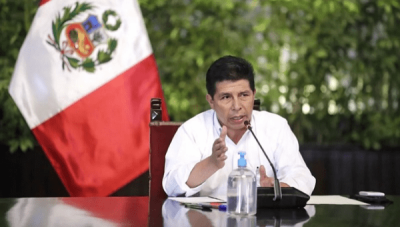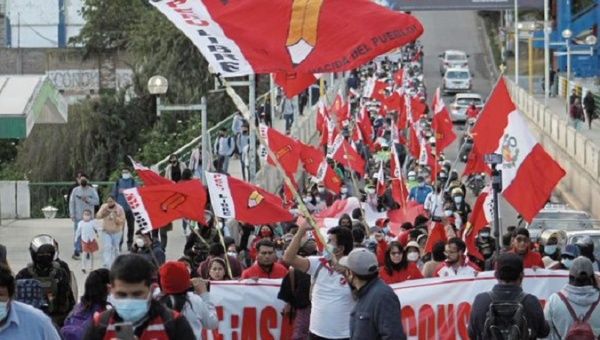Peru President Pedro Castillo Threatened by Attempts to Stage Right-wing Coup
Opposition forces have clashed with leftists and trade unionists over the future of this South American state

All Global Research articles can be read in 51 languages by activating the Translate Website button below the author’s name.
To receive Global Research’s Daily Newsletter (selected articles), click here.
Follow us on Instagram and Twitter and subscribe to our Telegram Channel. Feel free to repost and share widely Global Research articles.
***
A tense political situation is developing in Peru where socialist President Pedro Castillo is under siege by conservative interest groups representing the middle and upper classes.
Earlier in November, right-wing forces staged a demonstration in the capital of Lima demanding the resignation of the government headed by Castillo, a former rural teacher and trade union leader.
On November 5, anti-Castillo protesters marched through the capital of Lima and other areas throughout the country. At the same time, supporters of Castillo have held demonstrations calling for the end of the attempts to have the president removed from office.
Castillo has been the focus of efforts to overthrow the government which was elected during July 2021. The victory of the current president shocked many within the ruling elites in Peru along with the United States. Since taking power there have already been two attempts to impeach the president. At present, six different investigations are underway by his political adversaries within the parliament along with the attorney general.
A third attempt to pass a motion of no-confidence in the Castillo administration is now before the parliament. The previous two attempts failed due to lack of support within the legislative body.
Peru Libre supporters march in defense of President Pedro Castillo in Lima
Divisions Within the Ruling Free Peru Party (Peru Libre)
There are legal efforts underway to place Peru Libre party leader, Vladimir Cerron, under 36-months of pre-trial detention. Cerron is being accused by opposition forces of funding Peru Libre with illegal money. The leader and party vehemently denies these allegations.
President Castillo resigned from Peru Libre, the party under which he was elected to office in July 2021. Disagreements between the president and the left-leaning party have hampered the capacity to implement much needed reforms.
In an article published by Peru Reports, it emphasized:
“On June 28, Peru Libre’s National Executive Committee issued a statement requesting Mr. Castillo’s resignation, arguing, among other things, that ‘the policies undertaken by his government are not consistent with what was promised in the electoral campaign.’ They claimed that Mr. Castillo has implemented a ‘looser neoliberal program’ and announced that Peru Libre ‘will continue to fight for the conquest of its legitimate aspirations.’ The leaders of Peru Libre blamed Mr. Castillo for having promoted the ‘internal fracture of his caucus,’ which went from having 37 members in July 2021 to just 16 in July of 2022. In May of this year, 10 congressmen from Peru Libre resigned from the party. All outgoing members belong to a group of professors who were invited by Mr. Pedro Castillo to join Peru Libre in the 2021 presidential elections. With the departure of this group, Peru Libre’s general secretary, Vladimir Cerrón, lost influence in Congress, as the dissident congressmen formed two different political parties.”
These divisions have added substantially to the political uncertainty in Peru. As early as October 2021, there were changes made to the cabinet of the Castillo government. Peru in recent years has undergone numerous impeachments and resignations within its ruling administrations.
The country has had five presidents in the last seven years. During the first year of the Castillo administration there have been mixed signals sent to the international community over the direction of domestic and foreign policy.
While Congressman and former Governor Cerron has maintained a harder line on relations with extractive firms, Castillo during his visit to the U.S. sought to provide incentives for the development of natural gas resources inside the country. Observers characterized the cabinet reshuffles as an effort to present a more moderate posture towards the international corporations and other potential investors.
In early October 2021, Gideon Long wrote of the Peruvian situation noting:
“Peru’s leftwing president Pedro Castillo has announced a significant cabinet reshuffle, ousting his divisive prime minister Guido Bellido and distancing himself from the Marxist party that helped to put him into power. In his boldest move since he took office in late July, Mr. Castillo replaced Mr. Bellido with Mirtha Vásquez, a young former congresswoman and moderate leftist who does not belong to the Marxist Free Perú party. The president made six other changes, including in the all-important mining ministry, where he appointed businessman Eduardo González. Labor minister Iber Maraví, a radical from Free Perú, was dismissed along with Mr. Bellido. The number of women in the cabinet increased from two to five.”
The constitution of Peru prohibits the president from standing trial for corruption until he leaves office. Castillo has rebuked his opponents saying he will remain in the presidency until his tenure in office is over in 2026.
Castillo has denied that he and his family are operating a criminal organization as claimed by his opponents in parliament. The president says the calls for him to resign are politically motivated.
Opposition forces are attempting to taint the president through accusations of corruption. These allegations are designed to discourage foreign investment which would result in the decline of the national economy.
Peru’s economy is largely based upon the extraction and export of copper. The country is the second largest supplier of copper in the world, right behind Chile. Copper exports earn 60% of Peru’s gross domestic product (GDP).
Forecasts for the following year suggest that the economy will grow at a slower pace. Despite the global economic crisis since 2020, the Peruvian economy was predicted to grow annually by more than three percent. Projections for 2022 have reduced the growth rate to 2.5 percent.
Peru’s Finance Minister Kurt Burneo told the Financial Times:
“It is obvious that political stability affects confidence on the part of investors. It makes them doubt. If there is no trust or it has been undermined, then obviously the investment rate is not going to make progress. The challenge is to separate economics and politics. We have to achieve that independence again.”
During September, Burneo introduced an economic plan which would provide incentives for capital investments along with an increase in subsidies for public transportation and energy costs for working and impoverished families. Altogether, 11 pieces of legislation are stalled in parliament due to the political turmoil taking place in the country.
Copper Mining and the Rights of Indigenous People
Complicating the political and economic situation even further are conflicts between two local communities against a mining firm which has been the focus of protests in recent months. Although the two communities were paid compensation for being relocated as well as receiving newly built homes from the mining firm, dissatisfaction has arisen due to the vast differences between the traditional and more modern living standards in the area. Protesters earlier in the year blocked access to the roads surrounding the mining project.
The Financial Times noted in the same above-mentioned report that:
“[W]hatever the regulatory framework looks like, negotiating the delicate balance between mining companies and skeptical local indigenous communities is crucial, and nowhere more so than at the massive Las Bambas copper mine, owned by the Chinese-controlled MMG Ltd. Protests at the Las Bambas mine and trucking routes have repeatedly halted operations, with the mine being shut down for over 50 days this year due to demonstrations. The Huancuire community — one of several that lives near the mine — opposes plans to open a new mining pit on land they once owned, though Burneo told the FT that the law was on the company’s side. ‘The piece of land has already been sold to the mining company and it cannot be sold twice, adding that the burden for resolving disputes with communities lies not only with the state. The participation of mining companies must also be seen there because it is these companies that are going to benefit as a result of the economic activity.’”
These events portend much for the future of the Castillo government in Lima. The administration has been able to withstand three attempts to remove the president. However, it remains to be seen how much more the government can sustain in its internal and external struggles.
Nonetheless, the hostility of the U.S. government towards leftist parties and administrations in Latin America cannot be ignored by the Peruvian people. International solidarity forces must uphold the right of the Peruvian people to resolve their internal problems without the interference of the imperialist states.
*
Note to readers: Please click the share buttons above or below. Follow us on Instagram and Twitter and subscribe to our Telegram Channel. Feel free to repost and share widely Global Research articles.
Abayomi Azikiwe is the editor of the Pan-African News Wire. He is a regular contributor to Global Research.
All images in this article are from the author


